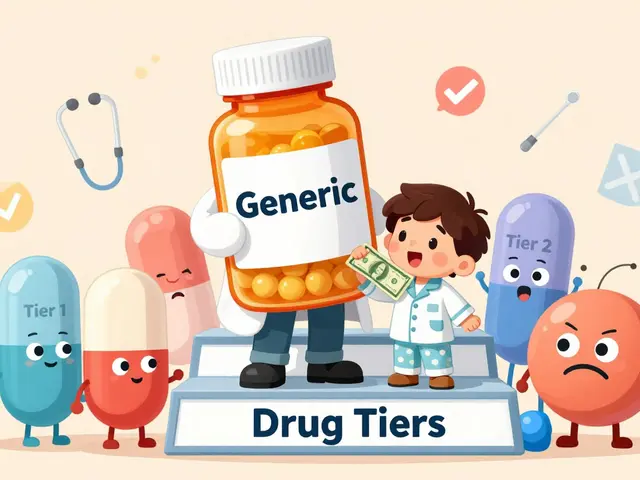Plaque Psoriasis is a chronic autoimmune skin disease that causes red, scaly patches (plaques) on the body. It affects about 2-3% of the global population and is driven by genetic and immune factors, notably over‑production of interleukin‑17 (IL‑17) and tumor necrosis factor‑alpha (TNF‑α).
Why Obesity Matters
Obesity is a medical condition defined by excessive body fat, usually measured by a body‑mass index (BMI) of 30kg/m² or higher. In the UK, more than one‑quarter of adults are classified as obese, and the prevalence has risen steadily over the past two decades, according to Public Health England data. The extra adipose tissue isn’t just a storage depot; it acts like an endocrine organ, releasing a cocktail of inflammatory molecules that can aggravate skin conditions.
Shared Inflammatory Pathways
Both plaque psoriasis and obesity are rooted in Inflammation a chronic, low‑grade immune response that fuels tissue damage. In obesity, enlarged fat cells secrete pro‑inflammatory cytokines such as IL‑6, IL‑1β and TNF‑α. These same cytokines are central to the psoriatic cascade, amplifying keratinocyte proliferation and plaque formation.
Metabolic Syndrome and Insulin Resistance
Metabolic Syndrome is a cluster of conditions-high blood pressure, elevated fasting glucose, dyslipidaemia and abdominal obesity-that together raise cardiovascular risk. People with plaque psoriasis have a 50% higher odds of meeting the criteria for metabolic syndrome, largely because chronic inflammation impairs insulin signalling. Insulin Resistance the reduced ability of cells to respond to insulin further fuels skin inflammation by increasing circulating glucose and free fatty acids.
Cardiovascular Consequences
The overlap doesn’t stop at the skin. Epidemiological studies from the American Heart Association show that individuals with both plaque psoriasis and obesity face a 2‑fold higher risk of myocardial infarction compared with those who have neither condition. The shared inflammatory milieu accelerates atherosclerotic plaque development, tying skin health to heart health.
Adipokines: The Missing Messengers
Adipokines are hormone‑like proteins released by fat tissue, including leptin, adiponectin and resistin. In obesity, leptin levels rise while adiponectin falls, creating a pro‑inflammatory environment that mirrors the cytokine profile seen in psoriasis. Some experimental therapies now target leptin‑mediated pathways to dampen skin inflammation.
Lifestyle Factors that Tip the Balance
Diet, physical activity and stress management are the three pillars that can either exacerbate or alleviate both conditions.
- Diet: High‑sugar, high‑fat diets increase gut‑derived endotoxins, which trigger systemic inflammation. Conversely, a Mediterranean‑style diet rich in omega‑3 fatty acids can lower IL‑17 levels.
- Exercise: Regular aerobic activity improves insulin sensitivity and reduces BMI, indirectly lowering psoriatic flare‑ups.
- Stress: Chronic stress boosts cortisol, which paradoxically can worsen psoriasis by dysregulating immune checkpoints.

Therapeutic Overlap: Treating One May Help the Other
Biologic agents that block TNF‑α (e.g., etanercept) or IL‑17 (e.g., secukinumab) have demonstrated secondary benefits on weight management. Clinical trials from the National Institute for Health and Care Research reveal an average 3‑4kg weight loss after 12months of consistent biologic therapy, likely due to reduced systemic inflammation and improved mobility.
Conversely, weight‑loss programs-whether surgical or lifestyle‑based-can enhance the efficacy of psoriasis treatments. A 2023 multicentre study showed that patients who lost ≥10% of body weight required 30% lower doses of biologics to achieve the same PASI (Psoriasis Area and Severity Index) improvement.
Comparison Table
| Attribute | Plaque Psoriasis | Obesity |
|---|---|---|
| Prevalence | 2-3% worldwide | ≈27% UK adults |
| Primary Driver | Autoimmune dysregulation (IL‑17, TNF‑α) | Excess caloric intake + sedentary lifestyle |
| Key Inflammatory Markers | IL‑17, IL‑23, TNF‑α | IL‑6, TNF‑α, CRP |
| Associated Risks | Metabolic syndrome, cardiovascular disease | Type2 diabetes, hypertension, joint disease |
| Impact of Weight Loss | Improves treatment response, reduces PASI | Decreases BMI, improves insulin sensitivity |
Connecting the Dots: Related Concepts
Understanding the psoriasis‑obesity link opens doors to a broader network of health topics. For instance, the Gut Microbiome influences both skin immunity and weight regulation, and emerging research suggests probiotic supplementation may reduce plaque severity. Similarly, Genetic Predisposition (e.g., HLA‑C*06:02) not only raises psoriasis risk but also interacts with genes linked to obesity. Exploring these intersections can guide personalized prevention strategies.
Practical Steps for Patients
- Monitor your BMI and aim for a healthy weight range (18.5-24.9 kg/m²). Even modest loss can lower inflammatory load.
- Adopt a Mediterranean‑style diet: plenty of fish, olive oil, fruits, and vegetables; limit processed sugars.
- Engage in at least 150minutes of moderate aerobic exercise each week.
- Discuss biologic options with a dermatologist; ask about potential weight‑related benefits.
- Work with a dietitian or weight‑loss coach to set realistic goals and track progress.
Future Directions
The research pipeline is buzzing with trials that combine anti‑inflammatory biologics with GLP‑1 agonists-drugs originally developed for diabetes. Early results hint at synergistic effects: better skin clearance and greater weight loss. As precision medicine tools mature, clinicians will likely screen for Adipokine profiles to tailor therapy.
Frequently Asked Questions
Can losing weight really improve my psoriasis?
Yes. Studies consistently show that a 10% reduction in body weight can lower the Psoriasis Area and Severity Index (PASI) by 25‑30%. Weight loss reduces systemic inflammation, which in turn lessens skin flare‑ups.
Are biologic drugs safe for overweight patients?
Biologics targeting TNF‑α or IL‑17 have a comparable safety profile across BMI ranges. In fact, some obese patients experience modest weight loss after starting therapy, likely due to reduced inflammation and improved mobility.
What role does diet play in managing psoriasis?
Diet influences gut microbiota and adipokine release. A Mediterranean‑style diet, rich in omega‑3 fatty acids, has been linked to lower IL‑17 levels and fewer psoriatic lesions. Reducing sugar and processed fats also helps.
Is there a genetic link between psoriasis and obesity?
Certain alleles, such asHLA‑C*06:02, increase psoriasis susceptibility and have been associated with higher BMI in genome‑wide studies. The overlap suggests shared pathways, but lifestyle remains a major modifier.
Should I get screened for cardiovascular disease if I have psoriasis?
Yes. Both psoriasis and obesity raise cardiovascular risk. Regular blood pressure, lipid, and glucose checks are recommended, especially for patients with severe skin involvement.






18 Comments
Interesting breakdown, but let’s not pretend this is new. The inflammation link between psoriasis and obesity has been textbook material since 2012. What’s missing here is the real-world applicability-how many patients actually stick to Mediterranean diets when they’re drowning in food deserts or working two jobs?
Look, I’ve seen this play out in my own clinic for over a decade-when patients lose even 10% of their body weight, their plaques don’t just improve, they vanish like morning mist. It’s not magic, it’s biology. The body doesn’t care about labels like ‘obese’ or ‘psoriatic’-it just wants balance. And guess what? Movement, real food, and sleep are the only prescriptions that actually work. No biologic can replace that. We’ve been so obsessed with drugs that we forgot the body was built to heal itself-if we stop poisoning it.
Thank you for sharing this. I’ve lived with psoriasis for 14 years and gained weight during flare-ups because I couldn’t move without pain. Losing 15 pounds didn’t cure me, but it made my biologics work better-and I could finally walk to the park again. Small wins matter.
So let me get this straight-you’re telling me fat people have inflammation and that causes psoriasis? Wow what a shocker. Next you’ll tell me smoking causes lung cancer or that the earth is round. I mean, I guess if you ignore genetics, lifestyle, and the fact that half the population is just built differently, sure. But calling obesity a ‘driver’? That’s just medical dogma dressed up as science
I’ve been reading up on adipokines lately and it’s fascinating how leptin and adiponectin act like emotional barometers for the immune system. It’s not just about calories in, calories out-it’s about signaling. When your fat cells are screaming in distress, your skin hears it. That’s why weight loss isn’t just about appearance-it’s about quieting a whole body-wide alarm system. I wish more doctors talked about it this way.
Oh here we go again the big pharma playbook. Biologics cause weight loss? Sure. And the FDA loves that because it means more prescriptions. But let’s be real-when you inject yourself with a $20,000/year drug that suppresses your immune system just to lose 4kg, you’re not healing. You’re outsourcing your body’s problems to a lab. Meanwhile, the real solution-diet, movement, stress reduction-is free and has zero side effects except maybe more energy and less anxiety. But hey, who needs that when you can have a shiny new IV drip?
The epidemiological data presented is robust and aligns with findings from the British Journal of Dermatology’s 2021 cohort study. The bidirectional nature of the relationship between adipose tissue-derived cytokines and keratinocyte hyperproliferation is well-documented. However, the assertion that weight loss improves biologic efficacy requires further stratification by baseline disease severity and metabolic comorbidity burden. One cannot generalize across heterogeneous patient populations without controlling for confounders such as socioeconomic status and access to nutritional counseling.
wait so if you lose weight your psoriasis gets better? i had no idea… also i think the table is missing something like ‘how many people actually follow this advice’… just sayin… typo? i think i meant ‘saying’
Oh my god I’ve been saying this for years! My dermatologist didn’t even mention weight until my PASI score hit 22. Then suddenly it was all about ‘lifestyle changes.’ Like I didn’t already know I was fat? Like I haven’t tried every diet under the sun? I’m tired of being lectured like I’m the problem. My skin is already a battlefield-now I’m supposed to feel guilty about my body too? Thanks for the guilt trip.
There’s something quietly poetic about how our skin reflects our inner ecosystem-when fat cells whisper inflammation, the epidermis shouts back in plaques. It’s not just disease-it’s dialogue. And the fact that a Mediterranean diet can dial down IL-17 like turning down a volume knob? That’s not medicine. That’s alchemy. I’ve seen patients transform-not because they ‘got disciplined,’ but because they finally stopped fighting their bodies and started listening. The body remembers. It always does.
Hey I just had a question-do you think psoriasis gets worse if you’re stressed about your weight? Like, what if you’re trying to lose weight but you’re so anxious it’s making your skin flare? Should you focus on mental health first?
OMG YES this is SO TRUE 😭 I started biologics and lost 7 lbs without even trying!! I think my body finally stopped being in ‘fight mode’ 🥹 Also I started eating avocado toast and my skin looks like a baby’s butt 🥑✨ #PsoriasisWins #WeightLossJourney
They don’t want you to know this but the government and Big Pharma are working together to make you fat so you need more drugs. The CDC is lying about BMI. The real cause? 5G radiation and chemtrails. Look up the 2017 NIH whistleblower report. Your skin is a sensor for the toxic environment they’re forcing on us. Lose weight? Nah. Fight the system.
You got this. I was where you are-scaly, tired, and feeling broken. Then I started walking 30 minutes a day and swapped soda for sparkling water. No magic. Just consistency. Your skin isn’t your enemy-it’s your messenger. Listen. Move. Breathe. You’re stronger than your plaques. 💪❤️
Just wanted to say this post was really helpful. I’m from a rural area and there’s zero access to dietitians or dermatologists who get this connection. I’ve been sharing this with my local support group. One lady said she lost 12 lbs and her plaques cleared 40%. We’re all just trying to find a way forward.
The data presented is methodologically sound and aligns with current clinical consensus regarding the inflammatory nexus between adiposity and cutaneous autoimmune pathology. Further longitudinal studies controlling for medication adherence and dietary compliance are warranted to isolate causal mechanisms.
It is imperative to recognize that the confluence of metabolic dysregulation and immune-mediated dermatological disease necessitates a multidisciplinary approach, integrating endocrinology, dermatology, and nutritional science. The clinical implications are significant and warrant institutional policy reform.
Let’s talk about the gut-because that’s where the real magic happens. In India, we’ve had fermented foods like idli, dosa, and curd for centuries. These aren’t just comfort foods-they’re microbial medicine. Studies show that people who eat traditional fermented diets have lower IL-6 and better skin outcomes. But here’s the kicker: it’s not about ‘dieting.’ It’s about reconnecting with food that your body recognizes. When you eat processed crap, your gut bacteria scream. Your skin hears it. Your immune system panics. And boom-plaques. We don’t need new drugs. We need to remember what our grandmothers knew: food is the first pharmacy. And yes, HLA-C*06:02 might make you more vulnerable, but your daily plate? That’s your power.